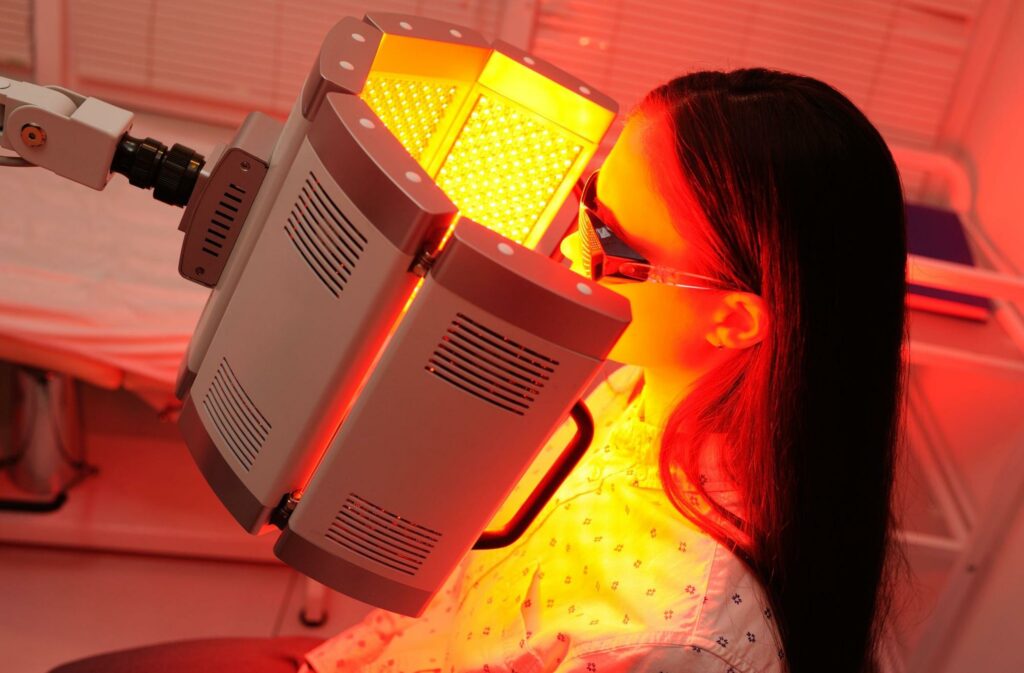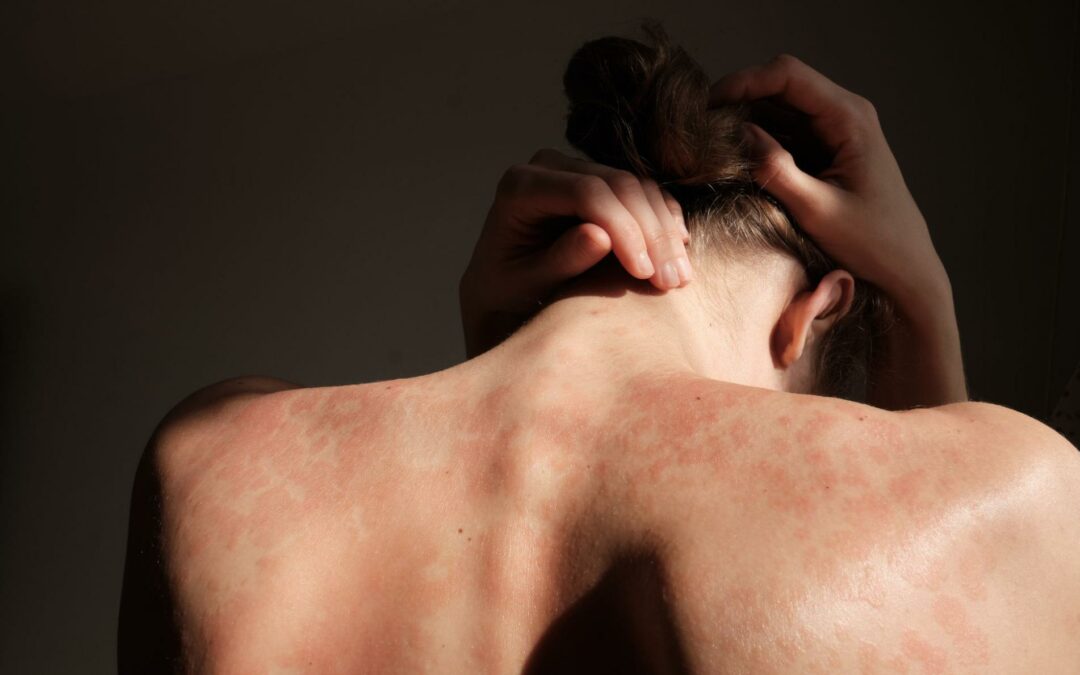Living with psoriasis can be challenging due to its persistent nature and the impact it has on daily life. While there are various treatments available, phototherapy has emerged as a promising option for many sufferers.
Keep reading and delve into the details of phototherapy, specifically narrow-band UVB treatments, and how they can help manage psoriasis effectively.
Understanding Psoriasis
Psoriasis is a chronic skin condition that accelerates the growth cycle of skin cells, leading to the buildup of cells on the skin’s surface. This results in patches of red, inflamed skin covered with silvery scales, commonly known as plaques. This autoimmune disease can occur on any part of the body, but it frequently affects the elbows, knees, scalp, and lower back.
Symptoms of Psoriasis
Psoriasis manifests in a variety of ways, often varying from person to person. The condition primarily affects the skin but can also have systemic implications. Here are the key symptoms to look out for:
- Red Patches of Skin Covered with Thick, Silvery Scales. These are the most recognizable symptoms of psoriasis. The patches are often raised and inflamed, ranging from a few spots of dandruff-like scaling to major eruptions covering large areas.
These patches can be itchy, painful, and sometimes crack and bleed. They commonly appear on the scalp, elbows, knees, and lower back but can occur anywhere on the body.
- Dry, Cracked Skin that May Bleed. The skin affected by psoriasis tends to become extremely dry, leading to cracks that can bleed. This symptom can cause significant discomfort and increase the risk of secondary infections due to open wounds.
- Itching, Burning, or Soreness. Psoriasis can cause intense itching and a burning sensation, especially during flare-ups. Soreness around patches is also common. The persistent itching and discomfort can interfere with daily activities and affect sleep, leading to further complications like stress and anxiety.
- Thickened or Ridged Nails. Psoriasis can affect the nails, causing them to become thickened, pitted, or ridged. This condition is known as nail psoriasis. Nail psoriasis can be painful and may lead to the separation of the nail from the nail bed (onycholysis). It can also be a cosmetic concern for many individuals.
- Swollen and Stiff Joints. About 30% of people with psoriasis develop psoriatic arthritis, which causes swelling, stiffness, and pain in the joints. Psoriatic arthritis can lead to joint damage and loss of function in the most severe cases, impacting the individual’s quality of life and mobility.
- Scalp Psoriasis. This specific type of psoriasis forms red, itchy areas with silvery-white scales on the scalp. It can extend beyond the hairline, affecting the forehead, back of the neck, and areas around the ears. The itching and visible scaling can cause social and psychological stress.
- Inverse Psoriasis. This type appears as bright red, shiny lesions in body folds, such as under the breasts, in the groin, or around the buttocks. Inverse psoriasis can be particularly uncomfortable due to the location of the lesions, which are prone to irritation from sweating and friction.
- Guttate Psoriasis. Characterized by small, drop-shaped sores on the trunk, limbs, and scalp. This type often starts in childhood or young adulthood and can be triggered by a bacterial infection such as strep throat. Guttate psoriasis can occur suddenly and cover large areas, making it quite distressing.
- Pustular Psoriasis. This rare form of psoriasis causes widespread pustules (blisters of non-infectious pus) on a red, inflamed background. It can be localized to certain areas like the hands and feet or cover larger areas of the body. Pustular psoriasis can be severe, requiring immediate medical attention due to the risk of complications such as fever, chills, and severe itching.
- Erythrodermic Psoriasis. The least common type of psoriasis, erythrodermic psoriasis, can cover the entire body with a red, peeling rash that can itch or burn intensely. This type can be life-threatening, leading to loss of fluids and proteins, and requires prompt medical intervention.
Recognizing these symptoms early and understanding their potential severity is vital for effective management and treatment.
Common Factors That Can Cause Psoriasis
Psoriasis is a complex condition influenced by multiple factors. Here are some common triggers:
- Genetics. Psoriasis often runs in families, indicating a genetic predisposition. If a close family member has psoriasis, your chances of developing it are higher.
- Immune System. Psoriasis is an autoimmune condition where the immune system attacks healthy skin cells by mistake, speeding up the skin cell production process.
- Infections. Certain infections, such as strep throat, can trigger or worsen psoriasis, particularly in children.
- Stress. High levels of stress can impact the immune system and trigger or exacerbate psoriasis.
- Weather. Cold, dry weather can lead to dry skin, which can trigger psoriasis flare-ups. Conversely, sunlight can have a positive effect on psoriasis.
- Injuries to the Skin. Cuts, scrapes, bug bites, or severe sunburn can trigger a psoriasis flare-up at the site of the injury, a phenomenon known as the Koebner response.
- Medications. Certain medications, including lithium, beta-blockers, and antimalarial drugs, can trigger or worsen psoriasis.
- Lifestyle Factors. Smoking and heavy alcohol consumption are linked to psoriasis, often worsening symptoms and making treatment less effective.
Phototherapy, particularly UVB and PUVA treatments, has shown effectiveness in addressing these triggers and managing psoriasis symptoms.
What is Phototherapy?
Phototherapy, also known as light therapy, involves exposing the skin to ultraviolet (UV) light regularly under medical supervision. It’s a treatment often used for various skin conditions, including psoriasis.
There are two main types of phototherapy used in the treatment of psoriasis:
What is UVB Phototherapy?
UVB phototherapy uses ultraviolet B light, which penetrates the skin and slows down the growth of affected skin cells. This treatment is divided into two types:
- Broadband UVB. Uses a wider range of UVB wavelengths.
- Narrowband UVB. Uses a narrower range of UVB wavelengths and is considered more effective with fewer side effects than broadband UVB.
XTRAC Excimer Laser
The XTRAC Excimer Laser is a UVB therapy treatment for psoriasis, recognized by dermatologists worldwide since its FDA clearance in 2000. This laser delivers a targeted, super-narrow UVB band to the affected areas, resulting in rapid and effective improvement.
Typically, patients experience symptom reduction in 10-12 sessions, with relief lasting for months. The treatment is painless, quick, and requires no downtime, eliminating the need for messy creams or daily skincare regimens. We offer this service at Metropolis Dermatology.
How UVB Phototherapy Can Treat Psoriasis
UVB phototherapy works by slowing down the rapid growth of skin cells that characterize psoriasis. Here’s how each type of phototherapy can help:
UVB Phototherapy
- Slows Skin Cell Growth: UVB light slows the abnormally rapid growth of skin cells associated with psoriasis.
- Reduces Inflammation: The UVB light reduces skin inflammation and improves symptoms over time.
- Fewer Side Effects: Compared to PUVA (psoralen plus ultraviolet A), UVB phototherapy generally has fewer side effects and is easier to administer.

Say Goodbye to Psoriasis with Phototherapy
Phototherapy, particularly with UVB treatments, offers a highly effective solution for managing psoriasis and other skin conditions. By leveraging the power of UV light, these treatments can slow down skin cell growth, reduce inflammation, and provide relief from the persistent symptoms of psoriasis. Beyond psoriasis, phototherapy’s benefits extend to various aesthetic treatments, making it a versatile and valuable option for achieving healthier skin.
At Metropolis Dermatology in Los Angeles, Pasadena, LA’s Westside (Brentwood), and Costa Mesa, CA, we are committed to helping you manage your skin condition with the latest and most effective treatments. Our team of experts will work with you to develop a personalized treatment plan that addresses your unique needs and helps you achieve the best possible results.
Take control of your psoriasis and explore the benefits of phototherapy. Call us now and schedule a consultation today!

